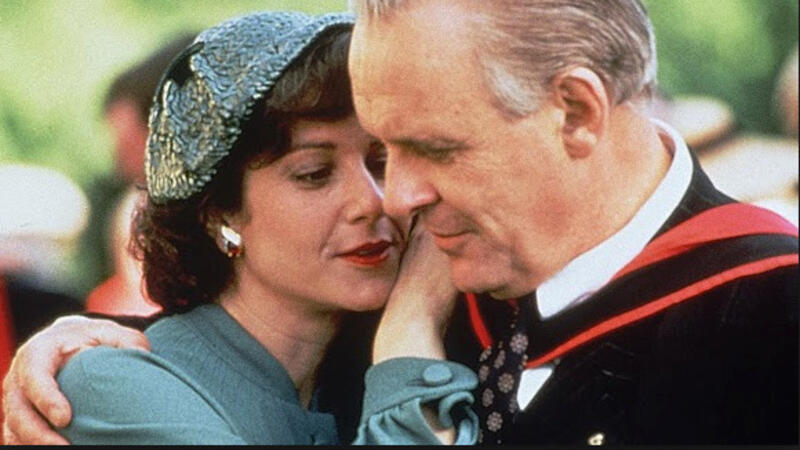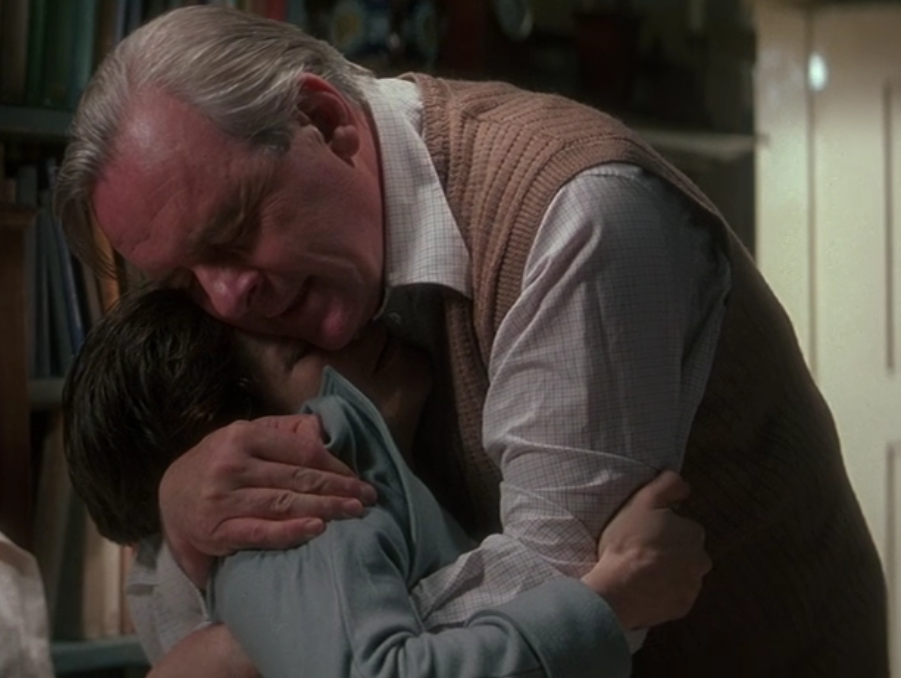Shadowlands (1993)

DIRECTOR: Richard Attenborough
CAST: Anthony Hopkins, Debra Winger, Joseph Mazzello, Edward Hardwicke, John Wood, James Frain
REVIEW:
Richard Attenborough’s Shadowlands, telling the true story of the romance between British author C.S. Lewis (best-known for his Chronicles of Narnia series) and American poet Joy Gresham between their meeting in 1952 and her death from cancer in 1960, is a stately, sedate, but tenderly heartfelt British period drama (steeped in oh-so-British reserve) that will surely strike some as too dry and slow to get into, but anchored by a quietly powerful performance by Anthony Hopkins and a restrained study in the gamut of emotions from joy to grief, may have much to offer for fans of these kinds of low-key serious dramas.
In 1952 Oxford, C.S. Lewis (Anthony Hopkins) is a mild-mannered middle-aged pipe-smoking bachelor, world-famous for his Narnia stories but living an uneventful life as a university professor, his sedate existence shared only with his brother Warnie (Edward Hardwicke). One day, Lewis agrees to a face-to-face meeting with American poet Joy Gresham (Debra Winger), with whom he had corresponded for some time, who’s run away to England fleeing a deteriorating bad marriage with her young son Douglas (Joseph Mazzello). Lewis and Joy strike up a friendship, and eventually agree to a marriage of convenience to allow the now-divorced Joy to obtain British citizenship. But when she is diagnosed with cancer, deeper feelings surface, and Lewis finds his comfortable routine and his faith challenged.
Shadowlands was summed up by The Washington Post‘s Rita Kempley as “a soap opera with a Rhodes scholarship”, but the muted, sedate tone keeps melodrama to a minimum, and Attenborough’s direction, while handsomely-filmed, is low-key and unobtrusive, and the result turns what could have been mawkish and overwrought into something quietly affecting. As befitting a character like Lewis, William Nicholson’s screenplay is literate and intelligent, with various excerpts from Lewis’ writings. Incidentally, this is not the first version of Nicholson’s script, which was first adapted as a 1985 TV movie starring Joss Ackland and Claire Bloom, and later as a 1989 play.
The crux of the film is the dynamic—and its shifting nature—between Lewis and Joy. They’re a study in contrasts; he’s a conventional middle-aged bachelor and academic, mild-mannered and unexciting, a devout Christian who gives reassuring lectures about God’s plans. She’s a Jewish-American ex-Communist with a blunt tongue and not shy with her opinions. Lewis finds his comfortable—overly comfortable, in fact—lifestyle disrupted by the forthright Joy, whose uninhibited behavior sharply contrasts with the rigid sensibilities of the male-dominated traditionalist university (to the disapproval of some of Lewis’ friends). He is shy and socially awkward sometimes to the point of being tongue-tied, while she sometimes flusters him by blurting out the things they’re both thinking but which he would never have said. At the same time, the movie suggests, Lewis needed someone to pierce the bubble of the safe uneventful cocoon he existed in, to make him truly alive and experience things he’d never felt before: romantic love, even with all the pain that opening oneself up can risk. “It is better to have loved and lost than never to have loved at all”, could sum up the movie’s core thesis in a nutshell. “The pain later is part of the happiness now…that’s the deal”, Joy puts it at one point.

It’s a tricky task to portray a character who runs a whole gamut of emotion, from disbelieving joy to tortured grief, while maintaining—apart from a couple cracks—a stoic stiff upper lip demeanor, but Anthony Hopkins is up to the challenge, masterfully avoiding the pitfalls of either making emotional repression come across as emotionless, or of ever making Lewis’ range of emotions feel forced or overacted (to say nothing of how very far removed the suppressed warmth and tender vulnerability he projects here is from his Oscar-winning chilling performance as Hannibal Lecter in The Silence of the Lambs two years earlier). That Lewis’ impassive exterior covers deeper currents is clear in an opening scene, in which Hopkins goes on a wonderfully passionate little monologue attempting to explain the magic of his Narnia stories and what they mean to children to his uncomprehending university colleagues, and much later on he gets two impactful scenes in which Lewis’ stiff upper lip cracks. In a way, this is both a companion piece and a contrast to his previous role in last month’s The Remains of the Day. In both movies, Hopkins plays a repressed man afraid to love, but the key divergence is that here, Hopkins lets himself. Alas, the other half of the romantic coupling, Debra Winger, isn’t up to Hopkins’ level. While Winger does an adequate job of tempering Joy’s sometimes abrasive exterior with an underlying vulnerability, there’s something forced and artificial about her acting—unlike Hopkins, Winger feels like she’s “acting”—and insofar as we care about Joy’s fate, it’s more due to Hopkins’ reactions than Winger herself. Joseph Mazzello acquits himself credibly, getting to do more “acting” here than in his far higher-profile role earlier this year in Jurassic Park (incidentally, he is reunited with his former onscreen grandfather Richard Attenborough, now his director, and Attenborough also first directed Anthony Hopkins sixteen years earlier in 1977’s A Bridge Too Far). The supporting cast includes a nice turn from Edward Hardwicke as Lewis’ brother, John Wood (the evil Archbishop in Ladyhawke) as a snooty university colleague, and James Frain as one of Lewis’ pupils.
While Shadowlands might hold more interest to C.S. Lewis fans, being familiar with Lewis’ writings isn’t necessary to the movie. In fact, while both his Narnia and theological and academic works are referenced, it’s in passing and the focus is squarely on his relationship with Gresham. The tone may be dry and austere—not unlike Lewis himself—but there are powerful emotions under the surface, which the restraint renders quietly affecting rather than cloying. As “tearjerkers” go, it’s nicely free of audience manipulation and relies on the characters and their circumstances, and that’s what makes it a well-crafted and intelligent drama.
* * *